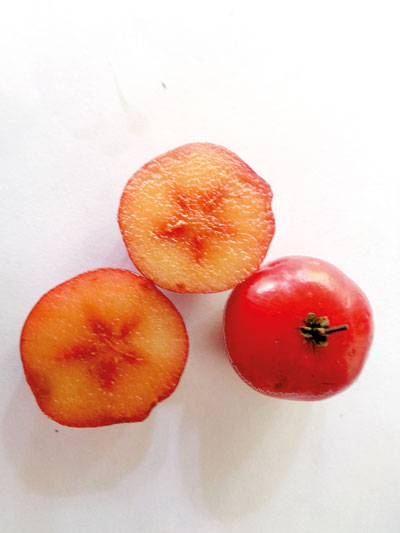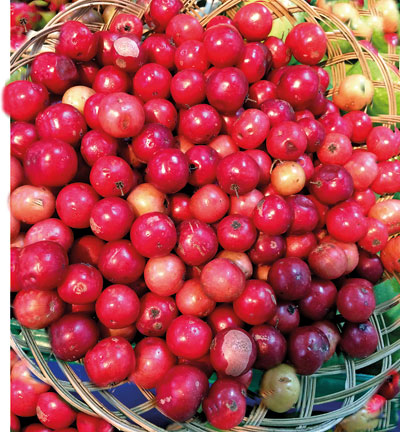The bright red tangy goodness
Months before Christmas the hustle and bustle to prepare wine at home was in full swing in the days gone by, in most of our homes as well as those of our friends and families. The large gallon containers were taken out and made ready for the fermentation while the fruits to be used were prepared with the other ingredients needed to make the wine.
 One of the many fruits that are used for the wine is the bright red lovi that is available in plenty a few months before Christmas. Lovi, scientifically Flacourtiainermis in the family Flacourtiaceae is commonly known as lovi-lovi or batoko plum in English. In Sri Lanka, the trees are found mainly in home gardens and all over the country other than at high elevations. They require little attention and can withstand high drought conditions. The fruits that are borne in bunches are plentiful during the seasons that are generally between April to about May and September to about November. It is common to see fruits strewn on the ground without any use during the season.
One of the many fruits that are used for the wine is the bright red lovi that is available in plenty a few months before Christmas. Lovi, scientifically Flacourtiainermis in the family Flacourtiaceae is commonly known as lovi-lovi or batoko plum in English. In Sri Lanka, the trees are found mainly in home gardens and all over the country other than at high elevations. They require little attention and can withstand high drought conditions. The fruits that are borne in bunches are plentiful during the seasons that are generally between April to about May and September to about November. It is common to see fruits strewn on the ground without any use during the season.
The lovi fruits resemble cherries, and are globose shiny berries about 1 to 2 centimetres in diameter turning from a yellow green to a deep red upon ripening. The fruits have a double layer of small seeds in a five-pointed star pattern. Fresh fruits can be stored at room temperature for two to 3 days.
While visually a very attractive fruit, it is extremely acidic if eaten in its fresh form off the tree. A better way to eating off the tree is to cut up the lovi and sprinkle salt and chillie powder, unique but a sour nice taste if you are into ‘lunu and miris kudu’ snacking. This is not all, there are unending possibilities with the lovi fruit, so do not let the fruits go waste. They are excellent in jams and preserves and can be used in sweet pies, crumbles and other desserts. Lovidosi where the fruit is cooked in sugar solution until coated with sugar is a delicacy. Lovi in pickles and chutneys are delicious.
Lovi also makes an excellent acid when added to meat, fish and vegetable curries. Cut the fruit into small pieces before adding, it also has a thickening effect. They can be easily brined and dried and stored similar to what we do with mango and biling. To do this place well ripened lovi in a moderately strong salt solution, add salt every alternate date until about a week has elapsed, then sun dry until encrusted with salt. These can be bottled and stored and can be used in mojus and even in sambols.
Nutritional benefits
Lovi fruits are rich in vitamin C and also have good amounts of vitamin A, vitamin B1 (thiamine), vitamin B2 (riboflavin) and vitamin B3 (niacin). Similar to other red fruits they also contain reasonably good levels of anthocyanins.
Vitamin C
Vitamin C also known as Ascorbic acid is required for the growth, development and repair of all body tissues. It also strengthens blood vessels and promotes wound healing and iron absorption. Vitamin C is necessary to synthesize and maintain collagen in skin, ligaments, blood vessels, muscle tissues and bones. Vitamin C is also a powerful antioxidant that is able to reduce oxidation damage caused by free radicals. It is an antimicrobial that can fight mild infections and is an immune system booster. Vitamin C also prevents atherosclerosis, supports immunity and is a key antioxidant. However all these benefits of the vitamin C in the lovi fruit can be of maximum advantage if the fruit is eaten fresh as vitamin C is very sensitive to heat, light and air. Short term cooking of the fruit will not deactivate the vitamin as much as if the fruit is cooked for a longer period at higher temperature.
 Vitamin A
Vitamin A
Vitamin A is a powerful antioxidant and plays a critical role in maintaining healthy vision and is needed for growth and cell development. It also maintains healthy skin, hair, nails, gums, glands and bones. Vitamin A is also a powerful antioxidant that neutralises free radicals in the body that causes tissue and cellular damage and helps reduce inflammation the root of all illnesses and diseases. Vitamin A is relatively stable against heat.
Vitamin B1, B2 and B3
All these vitamins belong to the B complex group of water soluble vitamins. The B1 vitamin plays an important role in maintaining a healthy nervous system and improving the cardiovascular functioning of the body. Vitamin B2 is required for energy production and represents an essential nutrient in our diets. Vitamin B3 on the other hand is important in maintaining good blood circulation, healthy skin and normal brain functioning.
Anthocyanins
Anthocyanins are the pigments that give the rich red colour to the lovi fruit. They act as antioxidants and fight free radicals and provide anti-inflammatory, anti-viral and anti-cancer benefits. They also aid weight loss and keep you looking good by preventing premature aging. Additionally anthocyanins are great for your heart and help clear bad cholesterol.


